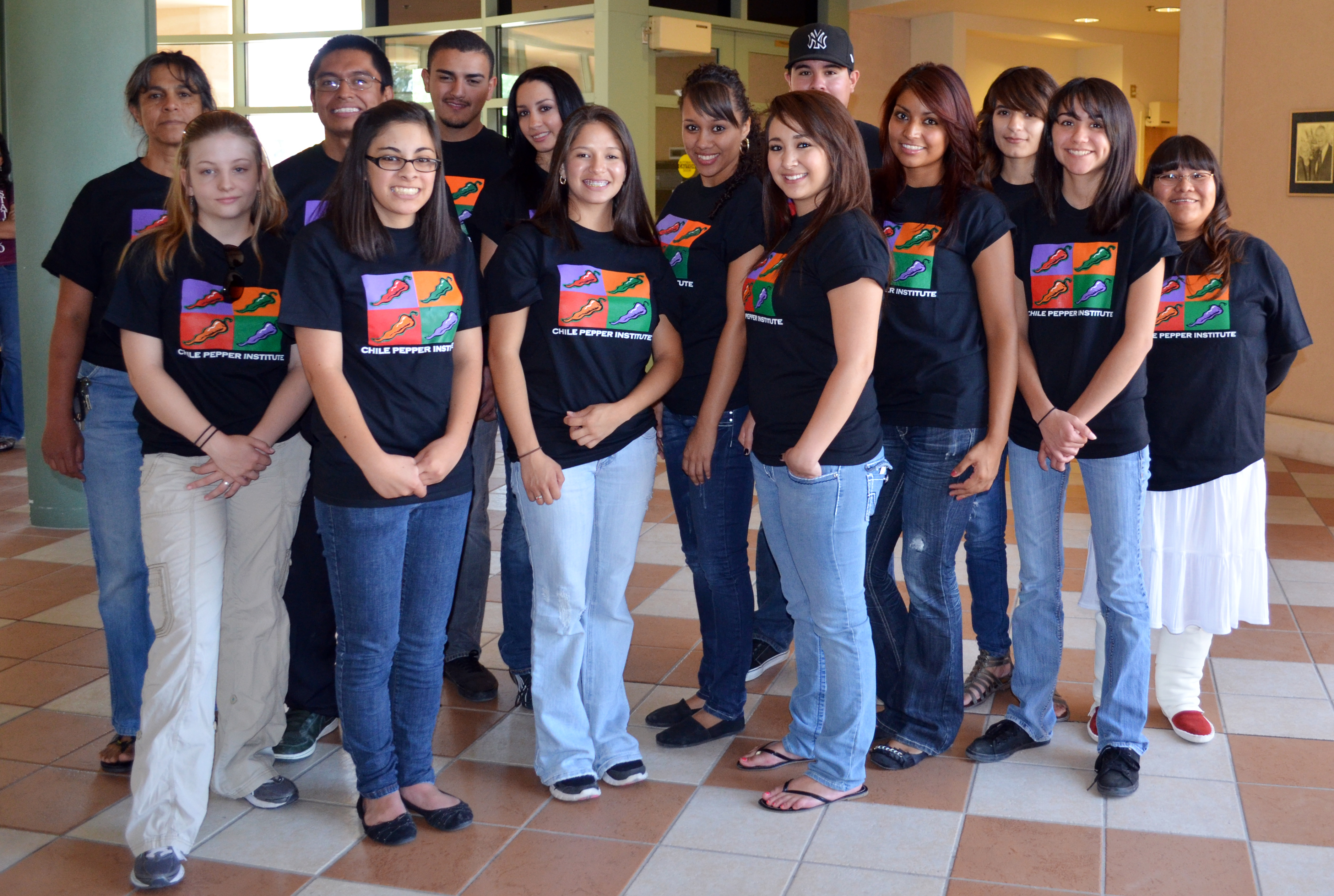NMSU students develop research skills at Southwest medicinal plants summer workshop

Using a variety of chiles, all four group projects explored the concentrations and health-related properties of capsaicin (the compound that puts the "heat" in chiles), ascorbic acid (the source of vitamin C in chiles), or both.
Laura Rodriguez-Uribe is a research scientist in the Department of Plant and Environmental Sciences who has led the workshop for the past two years. She said the students began with Internet reviews of previously published research on chiles. That was followed by lectures on a variety of topics, from the basics of working in a lab and the history and taxonomy of chile peppers, to basic microscopy, extraction techniques for capsaicin and pigment compounds, and methods of analyzing the concentrations of the compounds and their active properties. Finally, the participants learned how to present their research findings in a professional way.
Each group worked with Rodriguez and with Rich Richins, who oversees the phytochemistry lab in PES, in selecting a research topic and designing experiments that could be accomplished within the time frame of the workshop. Also assisting the students was biology master's student Natasha Yazzie.
This was the 12th year for the workshop, a component of NMSU's RISE to Excellence Program funded by the National Institutes of Health.
"The primary purpose of the workshop is to interest minority and disadvantaged students in pursuing graduate study and careers in biomedical research and related fields," said Elba Serrano, Regents Professor in the Department of Biology and director of the RISE program.
Mary O'Connell, a Regents Professor in PES, and Antonio Lara, associate professor of Chemistry, jointly developed the program 15 years ago.
"If we don't have a lot of different minds working on health problems, we won't get as good a solution, and we also may not address the health concerns of everyone in the United States," O'Connell said at the recent poster session, explaining how the workshop came into being.
"We thought that medicinal plants, which play a large role in the social and cultural fabric of the Hispanic and Native American communities, would be a way, would be a hook, to entice these students to participate."
Learning by doing and working in teams have been two of the basic principles of the workshop since its inception. Some of the participants have had little or no previous laboratory experience, but each group has included at least one student involved in a science-oriented field.
A high percentage of participants have continued on in science, according to O'Connell, who directed the program for the first 10 years. She reports that the program trained 250 students during that period and that "on average, 65 percent of the participants continued conducting research at NMSU as undergraduates."
She says many have gone on to pursue advanced degrees in public health, life sciences and medicine.
Daniel Ramirez-Gordillo is one such student. He was a workshop participant in 2003 as an incoming freshman student. He attended this year's poster session and had conversations with all of the presenters.
"This was my first experience doing research, and I liked it so much - I was fascinated and passionate about it - that I went on to earn my master's," he said. "And now I'm working on my Ph.D. in biology here at NMSU."
Ramirez said his group was investigating the antibacterial properties of mesquite that year.
His career goal is to become a professor and he looks forward to organizing programs like this that will give tomorrow's incoming freshmen and undergrads an opportunity to get hands-on research experience.
This year the workshop recruited students from another NMSU student success initiative: the College Assistance Migrant Program, a federally funded program that provides support primarily for college students from migrant or seasonal farm worker families. Four of this year's workshop participants were from CAMP.
One of those students was Araceli Delgado, who is majoring in family and child sciences.
"When I got into the program, everything was really new to me," Delgado said, adding that science hasn't really been her forte. But in the workshop setting, she was successful.
"It was so interesting and I just got it really fast," she said. "I'm so lucky to have been able to do it."
Delgado's research group partners were Darbie Davis, an incoming freshman wildlife science major, and Kathrin Sanchez, majoring in both biology and government. Their experiment compared the inhibitory effects of capsaicin on a variety of bacteria implicated in several serious human diseases and two varieties of yeast cells.
In another project, Gabriela Anguiano-Molina, Amada Banuelos and Pedro Gonzalez used a technique known as High Performance Liquid Chromatography to compare ascorbic acid concentrations in jalapeno, habanero and red bell peppers in their raw, roasted and dried forms.
They found that for all varieties, raw peppers had the highest concentrations of ascorbic acid and the dried had the lowest; red bells had the highest concentration of ascorbic acid in the raw and roasted states, but habaneros actually retained the most in the dried state. Their results confirmed past research found in the literature.
Gonzalez, a secondary education-history major, said that as a result of the workshop he is likely to add a biology component to his undergraduate program.
"I really enjoyed working with these students and I think that this was a privilege for me, to be able to work with students from different disciplines," workshop leader Rodriguez said.
"To see all the growing the students have gone through just makes me more secure that these are students who will pursue a career in a science field."
For more information about the Medicinal Plants of the Southwest summer workshop, go to http://medplant.nmsu.edu More about NMSU RISE can be found at http://web.nmsu.edu/~rise/about-2/a-message-from-the-director/.


